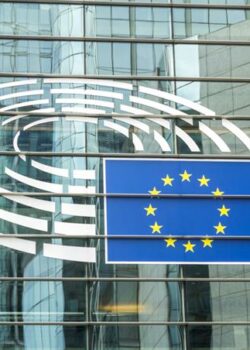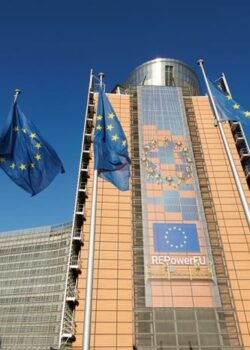The EU Non-Financial Reporting Directive has introduced a new requirement for large EU companies to disclose information about policies, risks and outcomes regarding environmental, social and employee matters; respect for human rights, anti-corruption and bribery issues; and board diversity.
The objective is to lay the basis for a new model of corporate reporting that considers financial and non-financial data equally essential for the future of business and key to understanding a company’s development, performance and position, as well as the impacts of its activity on society.
The Directive comes at a time of high political, economic and social turmoil worldwide with record-low levels of trust in business, according to the last Edelman Trust Barometer. The credibility of corporate CEOs fell to 37%, a 12-point drop from the previous year.
In addition to growing inequality, which is arguably the key reason behind this failure of trust, the relationship between society and business is souring because many of our current global challenges are intrinsically connected with the economy and, by extension, with business. These include climate change; doing business within the limits of the planet’s resource boundaries; and negotiating the complicated relationship between globalisation, development and human rights.
If properly implemented, the Directive will help to promote transparency and a stronger corporate governance framework that enables boards to better anticipate challenges and opportunities associated with their business models.
Improved and integrated disclosure of both financial and non-financial information leads to better understanding of the role of societal and environmental sustainability for delivering on the twin objectives of creation of real value for customers and wealth for shareholders.
Who has to report?
The requirements apply at a minimum to large publicly traded companies, credit institutions, insurance companies, and designated public interest entities, with more than 500 employees and either a balance in excess of 20 million euros, or a net turnover in excess of 40 million euros. Subsidiary companies are not obliged to report if the information is contained within a consolidated annual report of a parent company.
The European Commission estimates that the new requirements will cover more than 6,000 companies, but it will likely be closer to 8,000 due to lower thresholds in some member states. These companies need to begin gathering and auditing information to prepare for publishing the required information within good time after the end of the 2017 financial year.
Companies are expected to disclose relevant information on environmental, social and employee matters; respect for human rights, anti-corruption and bribery issues; as well as board diversity (only applied to large listed companies). Companies, where relevant and proportionate, are also expected to disclose material information on supply chain matters.
If a company does not pursue any policies in relation to one or more of the matters listed above, it must provide a clear and reasoned explanation for not doing so. There is an exemption from disclosing information that would seriously prejudice the company’s commercial position.
The Directive contains minimal mandatory elements and companies have considerable discretion over what information to disclose, as well as the format and structure of the information they report.
They will be required to include the following:
• a brief description of the company’s business model;
• a description of the policies pursued by the company in relation to those matters, including due diligence processes implemented;
• the outcome of those policies;
• the principal risks related to those matters linked to the company’s operations and how they are managed;
• and non-financial key performance indicators relevant to the particular business.
Most, if not all, of the companies covered by the Directive have disclosed at least some non-financial information in the past and will be able to focus on the places where they are weakest. The information is expected to be relevant, material, balanced and inclusive (considering all stakeholders), comprehensive and unbiased (positive and negative impacts should be included).
The materiality of the information should be considered not only according to the impact on the company’s short-term financial position and development, but also according to the impact on society.
In short, any risks of severe impacts or actual impacts associated with the company’s own activities or its business relations, including the supply chain, must be disclosed alongside a description of how the company manages such risks.
Additionally, the European Commission is preparing non-binding guidelines inspired by existing best practice and standards. The publication of the guidelines has been delayed to late spring 2017 to allow the Commission to take into account the recommendations of the Financial Stability Board Task Force on Climate-related Financial Disclosures.
Form of reporting
By default, this information should be included in the annual management report. However, the Directive gives flexibility for a non-financial statement to be produced in a separate report, provided that such a report is published within six months after the balance sheet date on the company’s website, and is referred to in the annual report.
The United Nations Principles for Responsible Investment (PRI) has recommended publishing it within the company’s annual report, as it would otherwise “result in investment-relevant, material information being delivered at a substantial delay to financial data”.
Companies can choose to use voluntary reporting frameworks (e.g. Integrated Reporting and the Global Reporting Initiative G4), which provide a structured approach to key issues of broad interest. If the company chooses to use a voluntary reporting framework, it must still verify that it has complied with the mandatory requirements of the Directive.
The role of the board
Boards are responsible for setting up proper governance systems, and have the ultimate responsibility to ensure the report is adequately prepared by overseeing and signing off the document.
The Non-Financial Reporting Directive offers an opportunity for businesses and investors to understand how environmental and social issues impact the organisation’s business model. It may also give useful feedback on the way that listed companies consider and integrate the risks and opportunities related to their decision-making and strategy.
As the liability of directors and CEOs for corporate performance on environmental, social and governance (ESG) matters may increase, boards are expected to adapt internal organisation, board governance, and communication.
A strategic approach to these matters will become a necessity as investors and other stakeholders are increasingly engaging with these issues. For example, Norway’s sovereign wealth fund, the largest such fund worldwide, opposed 6,700 company resolutions in 2016, mostly related to board issues at annual meetings.
Sustainable economy trend
The Non-Financial Reporting Directive is part of a general trend to increase corporate transparency and disclosure, including anti-corruption and money laundering laws, measures to eliminate child labour and modern slavery, and other initiatives to promote corporate responsibility.
Business and political trends are firmly shifting towards a responsible and sustainable economy, and both risks and investment opportunities arise from this process. This is supported by research that demonstrates that corporations with a good ESG performance and reporting outperform their peers on the stock market and benefit from a lower cost of capital.
Furthermore, sustainable and responsible investing strategies are enjoying extraordinary success. Back in 2012, $2.6bn-worth of green bonds were issued globally. That number had risen to $74.3bn in November 2016.
The Non-Financial Reporting Directive, if properly implemented, offers an opportunity to integrate the risks and opportunities associated with ESG factors into core business strategy. This in turn will reduce current and future negative impacts and help companies to identify opportunities to create positive long-term value.
Paige Morrow is head of Brussels operations at Frank Bold, a purpose-driven law firm. The firm leads the Purpose of the Corporation Project, which invites businesses, academics, policymakers and civil society to debate the future of publicly traded companies.Raw





